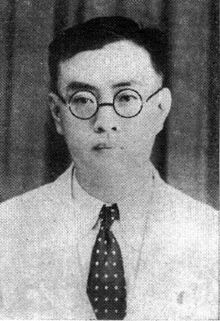Nio Joe Lan
| Nio Joe Lan | |
|---|---|

Nio, c. 1940
|
|
| Born | 29 December 1904 Batavia, Dutch East Indies |
| Died | 13 February 1973 (aged 68) Jakarta, Indonesia |
| Occupation | Social worker, entrepreneur |
Nio Joe Lan (Chinese: 梁友兰; pinyin: Liáng Yǒulán; Perfected Spelling: Nio Yu Lan; also known by the Indonesianised name Junus Nur Arif; 29 December 1904 – 13 February 1973) was a Chinese-Indonesian writer, journalist, and history teacher.
Nio was born on 29 December 1904 in Batavia, Dutch East Indies (now Jakarta, Indonesia), the son of a rich batik merchant and his wife. After elementary school and home-schooling in the Chinese language, as a teenager Nio began studying to become an aircraft maintenance engineer, a trade rare in the Dutch East Indies. Although he completed his studies in 1924, Nio was unable to enter the field; his father had died recently and his mother had been cheated out of the factory. Instead Nio, with the help of Lauw Giok Lan, his classmate's father, became a journalist with the newspaper Keng Po. From 1928 to 1934 he served as its editor before a reshuffling.
In 1934 Nio transferred to the daily Sin Po, also in Batavia, a newspaper known for its fervently pro-Chinese orientation. Nio, working as an editor, generally avoided mixing politics with his journalism, focusing instead on culture. Meanwhile, he wrote articles on various topics, including Chinese Malay literature, in Dutch journals such as De Indische Gids as well as English ones such as The China Journal. By this time he had become active in social work with the Tiong Hoa Hwe Koan, serving as its secretary. In 1939 Nio was part of a team which wrote a book commemorating the Tiong Hoa Hwe Koan's 40th anniversary.
When the Japanese occupied the Indies in February 1942, Nio was one of at least 542 ethnic Chinese from Java and Madura who were arrested and detained. He was held in Bukit Duri, then Serang, and then Cimahi, before ultimately being released in 1945 after the Japanese surrender and Indonesian proclamation of independence. A written account of his experiences while an internee was published in 1946, with the title Dalem Tawanan Djepang. Sinologist Myra Sidharta describes it as valuable account of history, as other former prisoners did not write such detailed memoirs.
...
Wikipedia
